La battaglia di Sambuco 29 maggio 2007
Appena concluso lo scrutinio delle schede elettorali, il neo-eletto Massimo Calleri ha dichiarato: "Sono orgoglioso di essere il Sindaco di Sambuco perchè questo è uno dei paesi montani con uno dei paesaggi più suggestivi, fatto di gente vera e concreta". Orgoglio giustificato, alla luce di una vittoria talmente eclatante da non lasciare spazio a recriminazioni di alcun tipo: la lista civica "Alternativa dei cittadini" guidata da Calleri si è affermata con una percentuale bulgara dell'80%, lasciando a Sabrina Giovine e al suo "Partito dei pensionati" un misero 20% dei voti. "Sono qui per fare il Sindaco di Sambuco, non per colonizzare nulla, per lavorare a favore di questo paese che se lo merita", ha poi aggiunto Calleri, chiosando in maniera apparentemente criptica.
Dietro quelle parole non si celava alcun enigma. Quelle parole rappresentavano semplicemente la situazione venutasi a creare a seguito del tentativo, finito male, di aggirare l'attuale legge elettorale, che impone ai sindaci italiani il divieto di ricandidatura dopo due mandati consecutivi. Giovanni Battista Fossati, il Sindaco uscente, aveva architettato una soluzione molto semplice: se non fosse stata presentata nemmeno una lista le elezioni sarebbero state annullate, il paese sarebbe stato commissariato per alcuni mesi ed entro l'autunno sarebbero state indette nuove elezioni, con conseguente rielezione garantita. Peccato che da Torino di liste ne siano arrivate due, quella di Calleri e quella della Giovine. E peccato che 5 dei 126 aventi diritto al voto nel comune di Sambuco si siano presentati alle urne. Il risultato finale è stato un rotondo 4-1 per Calleri e un travaso di bile per Fossati: "Sono stato sindaco di Sambuco per un decennio, la mia lista aveva nel simbolo la stretta di mano. Ora si crea questo clima kafkiano, in cui bucanieri della partitocrazia, gente che della politica ha fatto un mestiere per trarne utili di varia natura, può prendersi un Comune senza sapere dov’è il municipio. È una vergogna".
Si, forse è una vergogna, non minore però del tentativo di aggirare le regole della democrazia messo in piedi da Fossati. Chi è causa del suo mal pianga se stesso.
Dietro quelle parole non si celava alcun enigma. Quelle parole rappresentavano semplicemente la situazione venutasi a creare a seguito del tentativo, finito male, di aggirare l'attuale legge elettorale, che impone ai sindaci italiani il divieto di ricandidatura dopo due mandati consecutivi. Giovanni Battista Fossati, il Sindaco uscente, aveva architettato una soluzione molto semplice: se non fosse stata presentata nemmeno una lista le elezioni sarebbero state annullate, il paese sarebbe stato commissariato per alcuni mesi ed entro l'autunno sarebbero state indette nuove elezioni, con conseguente rielezione garantita. Peccato che da Torino di liste ne siano arrivate due, quella di Calleri e quella della Giovine. E peccato che 5 dei 126 aventi diritto al voto nel comune di Sambuco si siano presentati alle urne. Il risultato finale è stato un rotondo 4-1 per Calleri e un travaso di bile per Fossati: "Sono stato sindaco di Sambuco per un decennio, la mia lista aveva nel simbolo la stretta di mano. Ora si crea questo clima kafkiano, in cui bucanieri della partitocrazia, gente che della politica ha fatto un mestiere per trarne utili di varia natura, può prendersi un Comune senza sapere dov’è il municipio. È una vergogna".
Si, forse è una vergogna, non minore però del tentativo di aggirare le regole della democrazia messo in piedi da Fossati. Chi è causa del suo mal pianga se stesso.
posted by Schloss Adler @ 09:23,
![]()
The Stricklands are Back On Track 22 maggio 2007
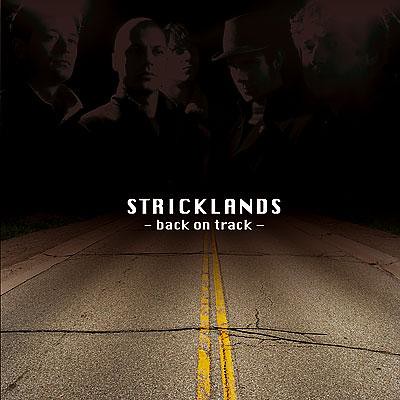 Dopo un’assenza dagli studi di registrazione durata quasi un lustro, gli Stricklands si ripresentano sulla scena punk-rock italiana con un album dal titolo significativo, Back On Track, appena pubblicato per l’etichetta Black Hellvis. I cinque anni trascorsi dall’uscita di The Stricklands (Power Pellets Records, 2002) - il primo lavoro della band, omonimo come spesso capita ai gruppi esordienti - sono stati caratterizzati dall’inserimento di alcuni singoli in un paio di compilations internazionali, dalla realizzazione autoprodotta di alcuni mini-album promozionali e, soprattutto, da importanti cambiamenti nella formazione. L’attuale line-up degli Stricklands è formata da Giulio Castagnini alias J.J. (Voce e Chitarra), Gabriele Falsetti alias Guyle (Voce e Basso), Duccio Vieri alias The Duke (Chitarra e Voce), Adriano Cecchetti alias A.C. (Chitarra) e Mattia Neri alias Matt (Batteria).
Dopo un’assenza dagli studi di registrazione durata quasi un lustro, gli Stricklands si ripresentano sulla scena punk-rock italiana con un album dal titolo significativo, Back On Track, appena pubblicato per l’etichetta Black Hellvis. I cinque anni trascorsi dall’uscita di The Stricklands (Power Pellets Records, 2002) - il primo lavoro della band, omonimo come spesso capita ai gruppi esordienti - sono stati caratterizzati dall’inserimento di alcuni singoli in un paio di compilations internazionali, dalla realizzazione autoprodotta di alcuni mini-album promozionali e, soprattutto, da importanti cambiamenti nella formazione. L’attuale line-up degli Stricklands è formata da Giulio Castagnini alias J.J. (Voce e Chitarra), Gabriele Falsetti alias Guyle (Voce e Basso), Duccio Vieri alias The Duke (Chitarra e Voce), Adriano Cecchetti alias A.C. (Chitarra) e Mattia Neri alias Matt (Batteria).Back On Track si compone di dodici tracce che lasciano trasparire le influenze di gruppi come i Kiss, i Motorhead, i Turbonegro e i Ramones sulla band senese. Si va da Monkey Army, invettiva contro il mondo contemporaneo popolato da un esercito di uomini-scimmia a Kill Now!, storia di un soldato che si ribella alle logiche militari, passando per Hiroshima Flames Rising, storia di una prostituta, e Mrs. Harker (‘Till The Break Of Dawn), serenata di un vampiro alla sua vittima-amata. Il disco, venduto alla modica cifra di 10 euro, può essere acquistato richiedendolo direttamente alla band via e-mail o tramite contatto myspace.
Il miglior motivo per acquistare un disco come quello degli Stricklands è che, per dirla alla Aldous Huxley, "dopo il silenzio ciò che si avvicina di più nell'esprimere ciò che non si può esprimere è la musica". Back On Track è un disco che esprime l'inesprimibile: non è poco.
posted by Schloss Adler @ 11:27,
![]()
Bulgaria 2007 06 maggio 2007
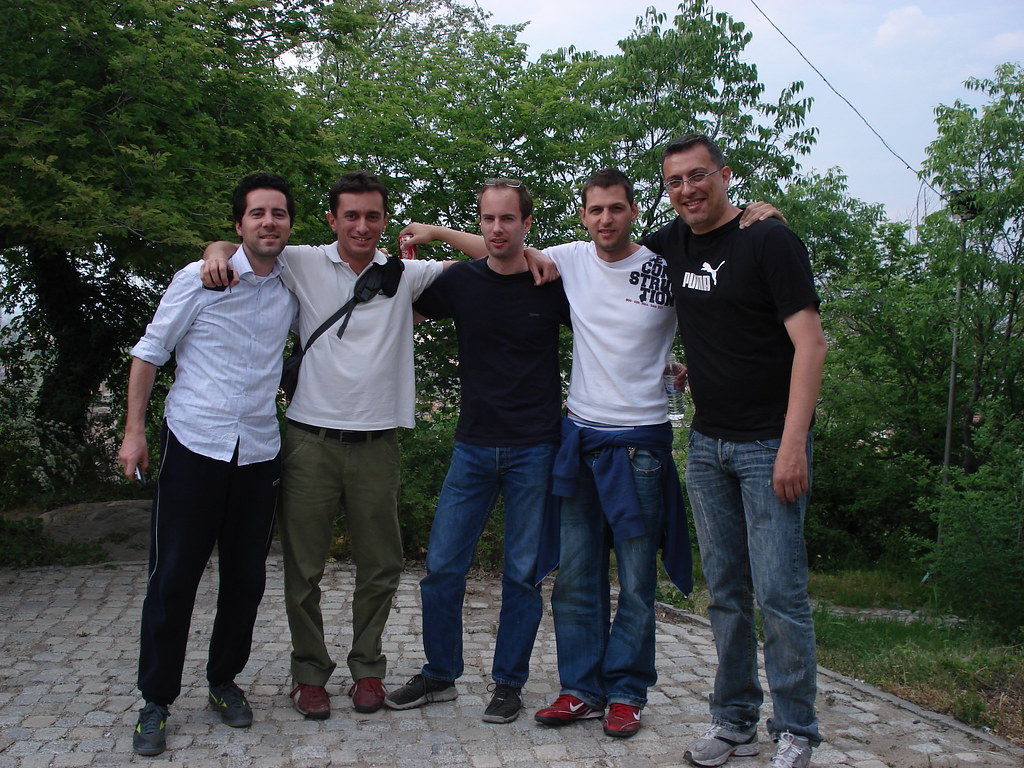 It was September 2000 when I packed my stuff into two enormous cases and caught, for the first time in my life, a plane which took off from Rome and landed in Brussels. I was supposed to spend one semester at the Katholieke Universiteit of Leuven, in the framework of the ERASMUS program, to write my thesis for my Degree in Economics. I didn’t write so much, but the time I spent in Leuven has been the best time in my life: I met wonderful people, tasted the majority of the 450 different varieties of beer produced by the Belgians, visited amazing Belgian cities like Antwerp, Bruges, Brussels and Ghent, travelled to England, France, Germany and The Netherlands, improved my English and much more. Moreover, I consider the time I spent in Leuven as something special for another reason: while there, I established some strong friendship relationships which are still up and running. In the very early days I met Tim, from The Netherlands, Georgi, from Bulgaria, and Lars from Sweden. A few weeks later I met Ciro, from Italy. From the very beginning, we spent a lot of time together, we created a truly solid group of friends, we enjoyed every day of our stay in Belgium. Though it’s natural that every story comes to an end, we’ve been able to stay in touch since every one of us returned home. One day we decided that we should arrange an annual reunion of the group: seven years after it all started, we’re still here doing it and this is a real miracle. The first reunion was made in Siena (IT) in 2003, the second one in Sofia (BG) in 2004, the third one in Copenhagen (DK) in 2005, the fourth one in Budapest (HU) in 2006. Unfortunately, I didn’t attend the 2006 reunion because I was sick, but I did my best to be in good shape for the 2007 edition: Bulgaria we’re back!
It was September 2000 when I packed my stuff into two enormous cases and caught, for the first time in my life, a plane which took off from Rome and landed in Brussels. I was supposed to spend one semester at the Katholieke Universiteit of Leuven, in the framework of the ERASMUS program, to write my thesis for my Degree in Economics. I didn’t write so much, but the time I spent in Leuven has been the best time in my life: I met wonderful people, tasted the majority of the 450 different varieties of beer produced by the Belgians, visited amazing Belgian cities like Antwerp, Bruges, Brussels and Ghent, travelled to England, France, Germany and The Netherlands, improved my English and much more. Moreover, I consider the time I spent in Leuven as something special for another reason: while there, I established some strong friendship relationships which are still up and running. In the very early days I met Tim, from The Netherlands, Georgi, from Bulgaria, and Lars from Sweden. A few weeks later I met Ciro, from Italy. From the very beginning, we spent a lot of time together, we created a truly solid group of friends, we enjoyed every day of our stay in Belgium. Though it’s natural that every story comes to an end, we’ve been able to stay in touch since every one of us returned home. One day we decided that we should arrange an annual reunion of the group: seven years after it all started, we’re still here doing it and this is a real miracle. The first reunion was made in Siena (IT) in 2003, the second one in Sofia (BG) in 2004, the third one in Copenhagen (DK) in 2005, the fourth one in Budapest (HU) in 2006. Unfortunately, I didn’t attend the 2006 reunion because I was sick, but I did my best to be in good shape for the 2007 edition: Bulgaria we’re back!28.04.07
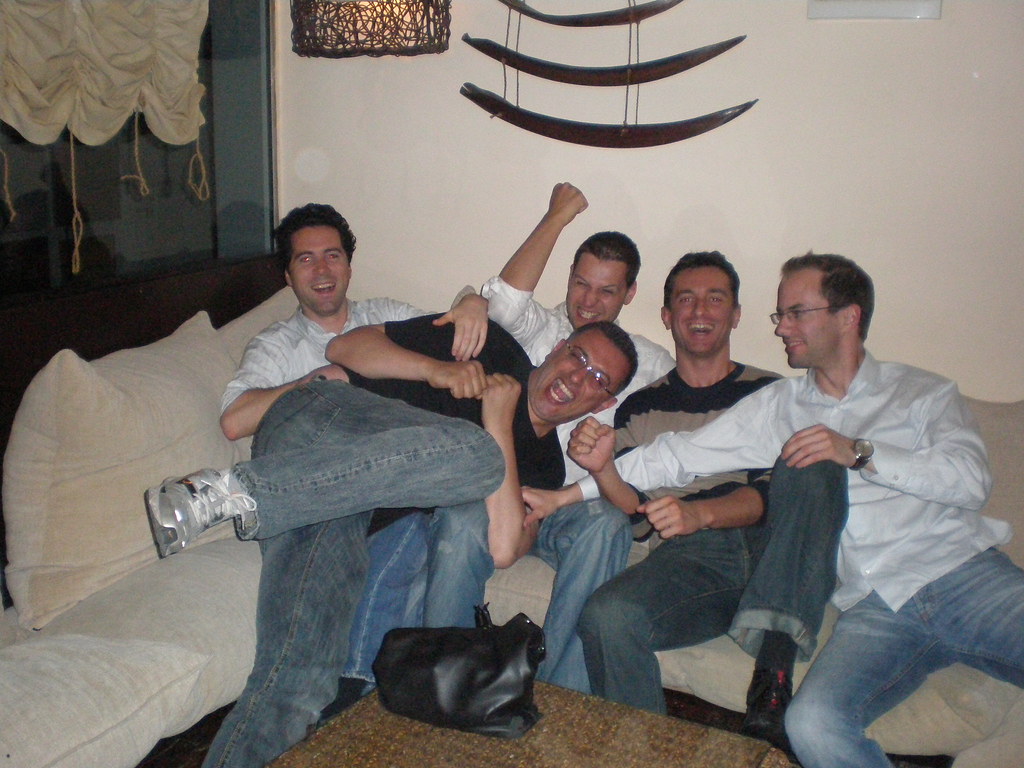 The journey began at about 4:00am as Ciro and I woke up and then drove to Venice Airport. The myair.com flight from Venice to Sofia was scheduled at 7:00am. Despite the lack of sleep, everything went smoothly. Ciro set the scene immediately for his main activity during the whole reunion: sleeping. He fell asleep before the take off and I woke him up when the plane landed in Sofia. Georgi was waiting for us at the airport: a massive hug welcomed us to Bulgaria. We packed our stuff into Georgi’s car and went to a big mall in downtown Sofia. We had a very good breakfast, a good chat and we checked out some shops. The first impression of the country, three years after our first visit, was distinctly positive. Perhaps a good indicator of this improvement was the renovated automotive fleet of Bulgaria: the overwhelming majority of cars are no longer the old Russian-made Ladas and Moskvitches. After a little walk and a pause for a coffee, we went back to the airport to welcome Tim and Lars, who were arriving at 1:00pm from Vienna. Zaro, a friend of Georgi, was there too with his car to guarantee a comfortable trip to Plovdviv. After leaving our luggage at Georgi’s flat, we walked to the city center and had a very good lunch at a restaurant we loved on our first visit to Bulgaria in 2004. Tim noticed that the brand of beer listed on the menu sounded familiar to him and asked the waiter: "Grolsch, is it Belgian?" The waiter answered precisely: "uh-oh-guh-guh". Yes, it is Belgian. In the afternoon, while the other guys were sleeping, I had a long chat with Georgi. We laughed a lot about one of his clients, the Municipality of Sliven, whose Mayor is Jordan Letchkov, the former Bulgarian football player. Letchkov commissioned Georgi’s Research Institute to do a brochure to introduce the city and industrial area of Sliven to potential investors. The nice thing is that Letchkov is convinced that a major business drive for the area could be a Formula 1 Grand Prix: he wants to organize one in Sliven, but right now there’s not a track in the city. In the evening we went out for dinner and Alex, Georgi’s girlfriend, joined us. After several drinks, we were back home, exhausted, at about 1.00am.
The journey began at about 4:00am as Ciro and I woke up and then drove to Venice Airport. The myair.com flight from Venice to Sofia was scheduled at 7:00am. Despite the lack of sleep, everything went smoothly. Ciro set the scene immediately for his main activity during the whole reunion: sleeping. He fell asleep before the take off and I woke him up when the plane landed in Sofia. Georgi was waiting for us at the airport: a massive hug welcomed us to Bulgaria. We packed our stuff into Georgi’s car and went to a big mall in downtown Sofia. We had a very good breakfast, a good chat and we checked out some shops. The first impression of the country, three years after our first visit, was distinctly positive. Perhaps a good indicator of this improvement was the renovated automotive fleet of Bulgaria: the overwhelming majority of cars are no longer the old Russian-made Ladas and Moskvitches. After a little walk and a pause for a coffee, we went back to the airport to welcome Tim and Lars, who were arriving at 1:00pm from Vienna. Zaro, a friend of Georgi, was there too with his car to guarantee a comfortable trip to Plovdviv. After leaving our luggage at Georgi’s flat, we walked to the city center and had a very good lunch at a restaurant we loved on our first visit to Bulgaria in 2004. Tim noticed that the brand of beer listed on the menu sounded familiar to him and asked the waiter: "Grolsch, is it Belgian?" The waiter answered precisely: "uh-oh-guh-guh". Yes, it is Belgian. In the afternoon, while the other guys were sleeping, I had a long chat with Georgi. We laughed a lot about one of his clients, the Municipality of Sliven, whose Mayor is Jordan Letchkov, the former Bulgarian football player. Letchkov commissioned Georgi’s Research Institute to do a brochure to introduce the city and industrial area of Sliven to potential investors. The nice thing is that Letchkov is convinced that a major business drive for the area could be a Formula 1 Grand Prix: he wants to organize one in Sliven, but right now there’s not a track in the city. In the evening we went out for dinner and Alex, Georgi’s girlfriend, joined us. After several drinks, we were back home, exhausted, at about 1.00am.29.04.07
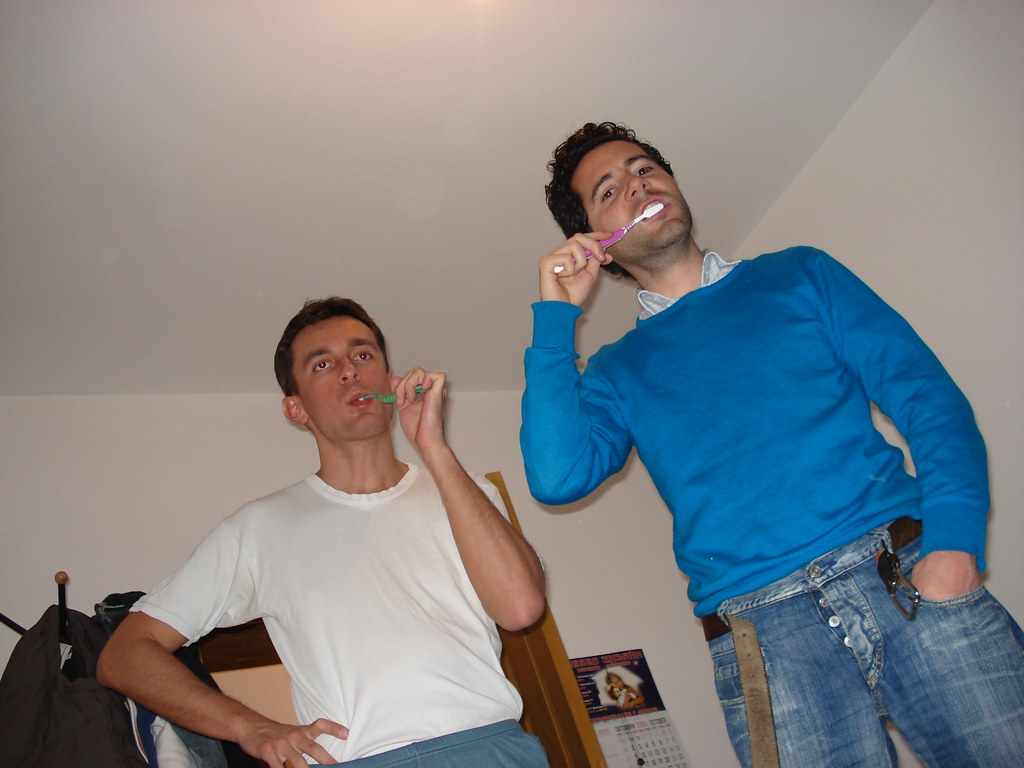 The second day started with a breakfast together with Tim and Lars in a bar closeby to Georgi’s house, while the rest of the troops were still asleep. By noon everybody was ready to go to the Bachkovo monastery, the second largest cloister of Bulgaria, founded in 1083. The monastery lies in the valley of the Chepelare river, about 10km to the south of the town of Assenovgrad, a city where one can see some huge numbered blocks, heritage of the Soviet influence after WWII. We were back to Plovdiv two hours later: we had a very good lunch and a long walk to climb one of the six hills of the city. In the late afternoon Tim received a great news: PSV Eindhoven won the championship for the twentieth time. After a good lunch and several drinks, we had a very long walk to reach a cinema and watch to “300”: English language and Bulgarian subtitles are a pretty unusual combination. Very good movie, indeed. We got back home at about 2.00am and, before going to bed, Lars thought that it would have been a good idea to spread on Ciro’s toothbrush some roll-on deodorant. A few minutes later, Ciro started shouting and coughing in the toilet and come back in the room saying: "Guys, my toothpaste is rotten". Lars and I were already laughing on the floor, Ciro joined us for ten minutes when we told him about the joke.
The second day started with a breakfast together with Tim and Lars in a bar closeby to Georgi’s house, while the rest of the troops were still asleep. By noon everybody was ready to go to the Bachkovo monastery, the second largest cloister of Bulgaria, founded in 1083. The monastery lies in the valley of the Chepelare river, about 10km to the south of the town of Assenovgrad, a city where one can see some huge numbered blocks, heritage of the Soviet influence after WWII. We were back to Plovdiv two hours later: we had a very good lunch and a long walk to climb one of the six hills of the city. In the late afternoon Tim received a great news: PSV Eindhoven won the championship for the twentieth time. After a good lunch and several drinks, we had a very long walk to reach a cinema and watch to “300”: English language and Bulgarian subtitles are a pretty unusual combination. Very good movie, indeed. We got back home at about 2.00am and, before going to bed, Lars thought that it would have been a good idea to spread on Ciro’s toothbrush some roll-on deodorant. A few minutes later, Ciro started shouting and coughing in the toilet and come back in the room saying: "Guys, my toothpaste is rotten". Lars and I were already laughing on the floor, Ciro joined us for ten minutes when we told him about the joke.30.04.07
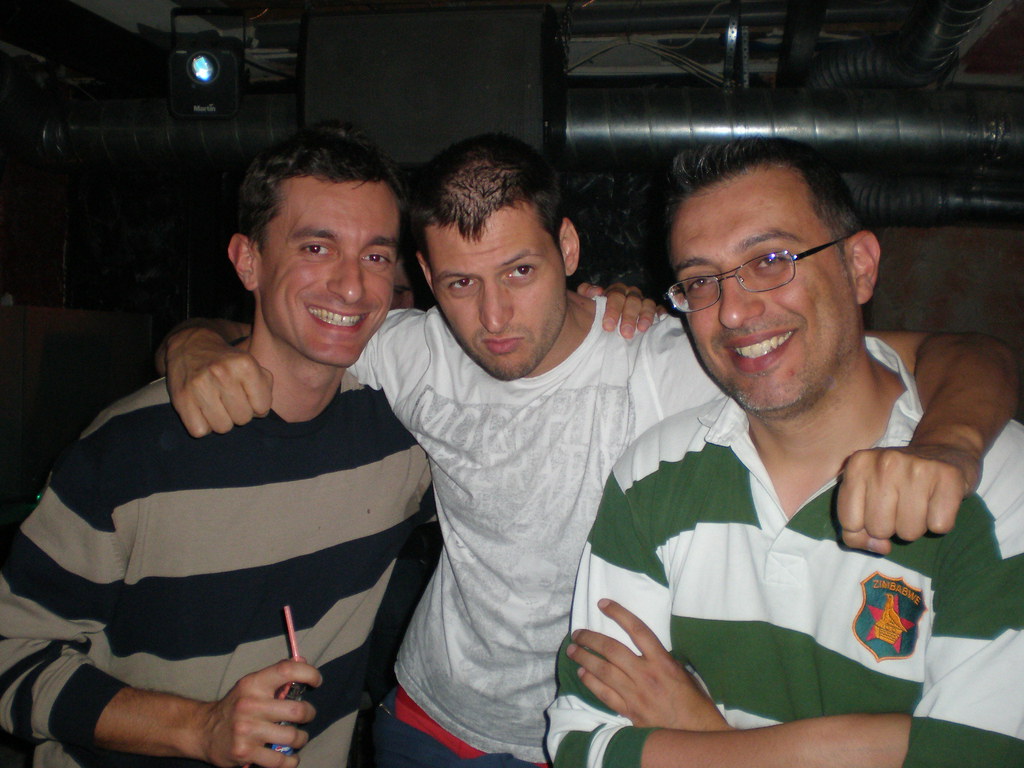 The third day started with a very good brunch in the Old Town. The Old Town has been declared an archaeological reserve and covers the three-hill area where the town was located originally. We took a long walk in the narrow cobbled streets of the Old Plovdiv while having a look at some of the most impressive baroque buildings of the whole country: the house of Koiumjioglu, now an ethnographical museum, and the house of Lamartin, where the French poet Alfonse de Lamartin stayed during his diplomatic mission in Turkey, are very impressive. We visited the only building open to the public, the house of Chomaka, now a museum dedicated to the Bulgarian painter Zlatyo Boyajiev: pretty strange paintings indeed. We spent some more time in the majestic Roman Theatre, which was completed under the rule of the Roman emperor Trajan, and is the largest Roman building found in Bulgaria: truly amazing. We had a relaxing afternoon on the balcony of Georgi’s house and in the evening, when we went out for dinner, a very nice friend of Georgi, named Rafi, joined us. While walking to the restaurant, I noticed a big statue representing some victorious soldiers and I asked Georgi: "Are they Russians?" Suddenly a guy gave me a strong slap on the shoulder and stated: "Excuse me! No Russians! Bulgarian!" Good, man, I trust you: peace and love. The rest of the evening went through a very good dinner, lots of drinks drunk in a pub while the TV broadcast some snooker championships and Tim and Rafi narrated us the complete biography of one of the players, Ronnie O’Sullivan and some final drinks in a disco. We left Georgi and Alex there and went home by taxi: the taxi driver was completely drunk and Tim bothered him with strange questions about football, safety belts and gasoline. The guy spoke some unintelligible words but when Tim generously gave him a tip of two leva, he showed us his happiness and gratitude by shouting: "Merci! Hollandia! Nistelroy! Joaquim Crujiff!"
The third day started with a very good brunch in the Old Town. The Old Town has been declared an archaeological reserve and covers the three-hill area where the town was located originally. We took a long walk in the narrow cobbled streets of the Old Plovdiv while having a look at some of the most impressive baroque buildings of the whole country: the house of Koiumjioglu, now an ethnographical museum, and the house of Lamartin, where the French poet Alfonse de Lamartin stayed during his diplomatic mission in Turkey, are very impressive. We visited the only building open to the public, the house of Chomaka, now a museum dedicated to the Bulgarian painter Zlatyo Boyajiev: pretty strange paintings indeed. We spent some more time in the majestic Roman Theatre, which was completed under the rule of the Roman emperor Trajan, and is the largest Roman building found in Bulgaria: truly amazing. We had a relaxing afternoon on the balcony of Georgi’s house and in the evening, when we went out for dinner, a very nice friend of Georgi, named Rafi, joined us. While walking to the restaurant, I noticed a big statue representing some victorious soldiers and I asked Georgi: "Are they Russians?" Suddenly a guy gave me a strong slap on the shoulder and stated: "Excuse me! No Russians! Bulgarian!" Good, man, I trust you: peace and love. The rest of the evening went through a very good dinner, lots of drinks drunk in a pub while the TV broadcast some snooker championships and Tim and Rafi narrated us the complete biography of one of the players, Ronnie O’Sullivan and some final drinks in a disco. We left Georgi and Alex there and went home by taxi: the taxi driver was completely drunk and Tim bothered him with strange questions about football, safety belts and gasoline. The guy spoke some unintelligible words but when Tim generously gave him a tip of two leva, he showed us his happiness and gratitude by shouting: "Merci! Hollandia! Nistelroy! Joaquim Crujiff!"01.05.07
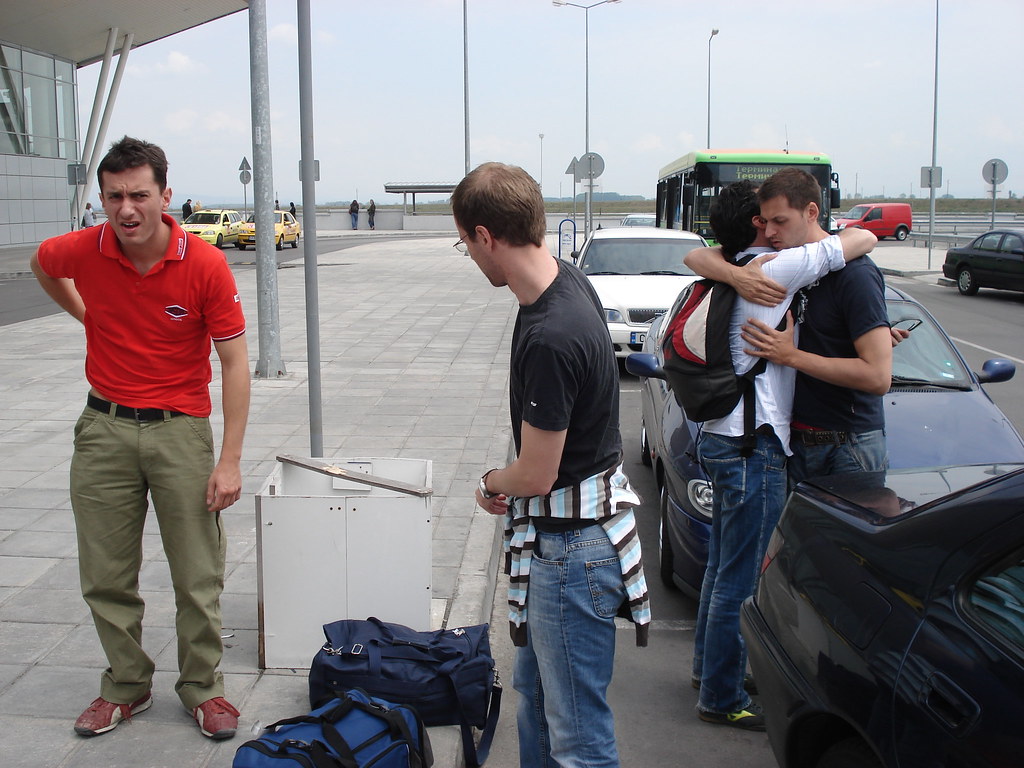 The last day started slowly: Georgi and I went to buy some breakfast while the others were packing their stuff and getting ready to leave the city. By noon we were all ready to go: we gave some warm hugs to Alex and asked her to take good care of our Bulgarian brother. We arrived at Sofia airport at 2.00pm and we had the first moment of the truth in the day: the reunion is already over for Tim and Lars, we hug each other and let them go. Being still a bit emotional, Georgi, Ciro and I went to the city centre. We first tried to buy a stamp for a postcard and had no luck: it looks like there are no stamps available in the whole country. After that, we had a nice coffee with Ruslan, one of Georgi’s friends, and then we went sightseeing in Sofia's downtown area which is compact and easy to get around on foot: the St. George Rotunda, the St. Sofia Church, the National Assembly, the King's palace and the Alexander Nevski cathedral. We did some shopping prior to going back to the airport at 6.00pm and we had the second moment of the truth in the day: the reunion is officially over when Ciro and I said goodbye to Georgi. It was 7.00pm, and I cried a bit.
The last day started slowly: Georgi and I went to buy some breakfast while the others were packing their stuff and getting ready to leave the city. By noon we were all ready to go: we gave some warm hugs to Alex and asked her to take good care of our Bulgarian brother. We arrived at Sofia airport at 2.00pm and we had the first moment of the truth in the day: the reunion is already over for Tim and Lars, we hug each other and let them go. Being still a bit emotional, Georgi, Ciro and I went to the city centre. We first tried to buy a stamp for a postcard and had no luck: it looks like there are no stamps available in the whole country. After that, we had a nice coffee with Ruslan, one of Georgi’s friends, and then we went sightseeing in Sofia's downtown area which is compact and easy to get around on foot: the St. George Rotunda, the St. Sofia Church, the National Assembly, the King's palace and the Alexander Nevski cathedral. We did some shopping prior to going back to the airport at 6.00pm and we had the second moment of the truth in the day: the reunion is officially over when Ciro and I said goodbye to Georgi. It was 7.00pm, and I cried a bit.
posted by Schloss Adler @ 15:15,
![]()
Da che pulpito viene la predica! 05 maggio 2007
Ai primi di marzo Angelo Bagnasco ha preso il posto di Camillo Ruini a capo della Conferenza Episcopale Italiana. Monsignor Bagnasco, che dev'essere uno zelante, non ha perso tempo e dopo un paio di settimane di preparazione ha subito messo le cose in chiaro: "Quando il criterio dominante è l'opinione pubblica o le maggioranze vestite di democrazia, che possono diventare antidemocratiche o violente, allora è difficile dire dei "no". Perché quindi dire no a varie forme di convivenza stabile giuridicamente, di diritto pubblico, riconosciute e quindi creare figure alternative alla famiglia? Perché dire di no all'incesto, come in Inghilterra dove un fratello e sorella hanno figli, vivono insieme e si vogliono bene?. Perché dire di no al partito dei pedofili in Olanda se ci sono due libertà che si incontrano? Bisogna avere in mente queste aberrazioni secondo il senso comune e che sono già presenti almeno come germogli iniziali."
Certo, ha ragione Monsignor Bagnasco, bisogna sempre tenerle presenti certe aberrazioni, in special modo quando riguardano esponenti della chiesa cattolica. Bisogna essere bravi latinisti e sapere come scrivere un documento chiamato Crimen sollicitationis, ovvero una direttiva segreta che fornisca istruzioni su come evitare che quei germogli iniziali conducano i loro "portatori insani" dritti in galera. Bisogna avere il coraggio di tacere, farsi complici e protettori di quei criminali. E bisogna poter contare su una stampa come quella italiana, collusa e servile nei confronti del potere ecclesiastico che non ha mai indagato sull'argomento nè ha mai mostrato al pubblico italiano una sconvolgente inchiesta della BBC sulle coperture offerte dal vaticano ai suoi preti pedofili sparsi in tutto il mondo.
Certo, ha ragione Monsignor Bagnasco, bisogna sempre tenerle presenti certe aberrazioni, in special modo quando riguardano esponenti della chiesa cattolica. Bisogna essere bravi latinisti e sapere come scrivere un documento chiamato Crimen sollicitationis, ovvero una direttiva segreta che fornisca istruzioni su come evitare che quei germogli iniziali conducano i loro "portatori insani" dritti in galera. Bisogna avere il coraggio di tacere, farsi complici e protettori di quei criminali. E bisogna poter contare su una stampa come quella italiana, collusa e servile nei confronti del potere ecclesiastico che non ha mai indagato sull'argomento nè ha mai mostrato al pubblico italiano una sconvolgente inchiesta della BBC sulle coperture offerte dal vaticano ai suoi preti pedofili sparsi in tutto il mondo.
posted by Schloss Adler @ 18:59,
![]()